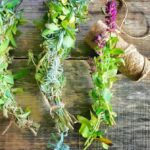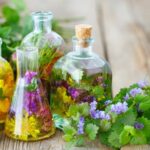If you prefer natural remedies, chances are you’ve heard a little about elderberry benefits. Elderberries have been used for centuries as a health aid and a home remedy for many different ailments and illnesses.
Elderberry wine, elderberry syrup, and other elderberry products have been used throughout history, both for taste and health. But what is the real story about this home remedy? Should you purchase the lozenges or gummies, you find in the store? Do they really work?
Here, we’ll explore some elderberry benefits and how you can enjoy the advantages of this antioxidant.
What are Elderberries?
Elderberries are a dark purple, nearly black berry that grows on the European Sambucus nigra tree. The American version (Sambucus canadensis) grows wild throughout Mexico and Central America, up to the Rocky Mountains. The European version is the type most commonly used for edible applications. There are also varieties native to North Africa, Patagonia, and West Asia.
Although it can be sensitive to extreme cold, you can grow a Sambucus nigra tree in many American garden zones. Both varieties are commonly found at nurseries and are excellent plants for birds, butterflies, and pollinators. The bushes have beautiful lacy leaves, and they can make lovely border plants around your garden. The European Sambucus is more tree-like, while the American version is a bushy shrub. Both produce (edible) white flowers that later give way to dark purple berries in the autumn.
Before you add an elderberry bush to your garden, you should note that it can take several years for the plants to produce berries. It’s also important to realize that the leaves, bark, AND berries are toxic if ingested raw, making the plant not suitable for gardens with pets or young children. However, with dense foliage, elderberry plants are attractive homes for birds and other woodland creatures. The plants require a fair amount of water and often grow near water sources in the wild.
If elderberries are toxic, why would people tout them as a health remedy? Well, as soon as the berries are cooked, they lose their toxicity while still retaining many health benefits. As we’ll explore, there are many elderberry benefits that make this a very useful plant in herbal medicine.
Elderberries are very small and grow in clumps. They look similar to a current. They have thick skin and are often sold dried or dehydrated for culinary applications. Elderberries taste tart with very little sweetness. They have an underlying earthy flavor as well. People have used the berries, and the edible elderflowers in wine, jam, and elixirs, often sweetened with sugar, honey, or maple syrup.
Elderberry Benefits: A Stronger Immune System?
These days, people are most often interested in the health benefits of elderberries. There are many elderberry recipes out there to help you make your own syrup, tinctures, jams, and gummies so that you can get all the benefits of this berry.
Nutritionally, elderberries are jam-packed with vitamins and antioxidants. In one cup of elderberries, you’ll get 97% of your RDA of vitamin A and 57% of your vitamin C. The berries offer 10.2 grams of dietary fiber per cup, as well. In addition, the berries contain antioxidants, potassium, and iron and may help fight inflammation in the body.
You can boost the immune benefits of elderberries by using them with probiotics. I recommend the Florify Daily Probiotic and Florify Deep Immune from Melaleuca. Their high-quality products are excellent and reliable. Taking a probiotic along with vitamin C has been studied as a preventative for respiratory illnesses and infection.
You can also use the Melaleuca Activate-C Immune Complex powder in conjunction with elderberries to increase your vitamin C intake. It’s an especially good idea if you feel like you’re coming down with something in the winter months. Vitamin C is water-soluble (meaning you’ll pass any excess in your urine), so it’s okay to take extra. Vitamin C helps with tissue growth and repair, and it’s great for the skin. The vitamin fights free radicals, which can combat heart disease, cancer, and the effects of aging. It can also help decrease the length of colds and respiratory infections for some people.
Because elderberries are high in these crucial vitamins and antioxidants, they likely provide some immune-boosting benefits. One study found that they could shorten the duration of cold symptoms by several days. Anecdotally, many people swear by a few elderberry gummies, a sip of syrup, or a lozenge to help ward off wintertime ills. Seeing as how it’s been around for centuries, it’s worth trying, especially if you lean toward a natural approach to health and wellness.
Over the years, elderberries have been used to treat and support:
- Heart health
- Immune function
- Joint pain
- Muscle soreness
- Respiratory infections
- Kidney issues
- Constipation
- Headaches
- Stress
- Skin conditions
While many of these remedies have yet to be scientifically proven, the nutritional profile of elderberries indicates there are probably real benefits thanks to the vitamins and antioxidants. What’s more, there are very few side effects or concerns with taking an elderberry product, as long as it’s properly cooked.
Uncooked elderberries or underripe elderberries can cause stomach issues even in small quantities. Large doses of the raw berries are poisonous and toxic. People with allergies to other berries should be careful when consuming elderberries, and those who are breastfeeding or pregnant should consult with their doctor before taking any remedy or supplement.
What Products are Made with Elderberries?
If elderberries sound appealing and you’re ready to try them, there are many different elderberry products that you can sample. You may see elderberry in the following forms:
- Lozenges
- Gummies
- Elixirs
- Syrups
- Pills
- Jams and jellies
- Drinks
- Tea
- Wine
- Drops or tinctures
- Food colorings
- Topical applications (like lotion)
People even enjoy elderberry-flavored liquor and vodka. Elderberries can be used as a tangy pie filing—with sweetener, the flavor is similar to cranberries or sour blueberries. Elderberry flowers are edible raw, and many people enjoy using them to infuse beverages (similar to the hibiscus flower). Elderflower cordial is a popular drink.
If you’re ready to enjoy some of the elderberry benefits, look for products in your local health or natural food store. Once you start watching for elderberry products, it may surprise you how ubiquitous these antioxidant berries have become.
Elderberry Gummies Recipe
Do you want to make your own elderberry supplement? Elderberry gummies are a relatively easy endeavor that you can make at home. However, be aware that the dark purple berries will stain countertops, clothes, or anything else they touch, so take precautions!
To make elderberry gummies, you’ll first need to make elderberry syrup. The syrup can be used by the spoonful as a supplement on its own (you don’t need to make it into gummies), but kids enjoy taking the fun shapes and the tart, earthiness is more palatable in the gummy form.
Ingredients Needed to Make Elderberry Syrup
- 1 cup of dried, organic elderberries
- 3 ½ cups of water
- ½ cup of tart cherry juice
- 1 tablespoon of grated ginger
- 1 tablespoon of lemon zest (reserve the lemon for juice)
- 1-2 cinnamon sticks
- 8-10 whole cloves
- ½ cup of organic, raw honey
- 3 tablespoons of lemon juice (approximately 1 lemon)
Add all the ingredients for your elderberry syrup, except the honey and lemon juice, to a saucepan. Bring the ingredients to a boil, and then reduce to a simmer. Allow the mixture to cook until it has thickened and reduced by half (about an hour). Next, strain the mixture using a cheesecloth or strainer.
Alternatively, you can make elderberry syrup in a pressure cooker or Instant Pot—cook for approximately 15 minutes. Strain the mixture and then use the sauté setting to reduce the liquid for an additional 10 minutes, stirring occasionally.
Once your mixture is reduced to a syrup, allow it to cool for about half an hour. Then add the honey and lemon juice. Transfer the syrup to a lidded mason jar and store it in the fridge for up to two months.
How to Make Elderberry Gummies from Syrup
- 1 cup elderberry syrup
- 5 Tablespoons plain gelatin
- ¾ cup hot water
- Gummy molds (silicone molds work best)
Whisk the elderberry syrup and gelatin together. Stir while adding hot water until all the gelatin is dissolved. Pour the mixture into the gummy molds (you may want to set the molds on a sheet pan to keep them steady). Transfer the mixture to the fridge and allow it to set 1-2 hours until the gummies are firm. Remove them from the molds and store them in an airtight container in the fridge for up to two months.
You can enjoy 2-3 gummies per day to get the elderberry benefits and keep your immune system strong!
Are you ready to try the immune-boosting benefits of this amazing plant? Let me know in the comments what you think of elderberries.
For more healthy ideas, don’t miss:
- How to Improve Gut Health Naturally
- Blueberries: The Superfood in Your Backyard
- 4 Health Benefits of Garlic








Comments & Reviews
Can I use fresh frozen elderberries to make your syrup recipe? If so, would it be the same amount as dried?
Yes, you certainly can Kam. Fresh or frozen elderberries work. I personally would keep the amount the same as elderberries that are dried, but obviously with frozen berries there is more water content. So you may end up with a larger quantity made afterward.